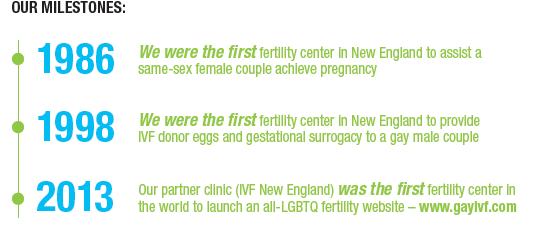Over the last 35+ years, our national network has helped thousands of individuals and couples, of every orientation and identity  build loving families. Our mission is to help you build yours.
build loving families. Our mission is to help you build yours.
Most of us are only taught one pathway to parenthood. Only a very lucky few of us are explicitly taught how to proceed when our family is not heterosexual or cisgender, or when we need to take a different pathway to parenthood for any other reason. With this in mind, it’s our job to provide you with the best advice possible.
We believe informed patients make smarter choices. We’ve gathered and answered our most common questions, so you can navigate your path to parenthood with ease and confidence.

What will fertility treatment cost?
Our costs are highly competitive and translate into great value when combined with our outstanding success rates. There’s no standard cost for patients; our prices vary by procedure and circumstance, and no two cycles are exactly the same. At your initial consultation, your doctor will recommend the treatment option that’s right for you, along with a treatment plan tailored to your needs and goals.
Our financial coordinators will advocate for you and help you every step of the way to make the most of your coverage. Your financial coordinator’s goal is to help you navigate the financial side of treatment, so you can focus on what’s important: building your family.
Does my health insurance cover fertility treatments for LGBTQ people?
Most insurance plans will cover assisted reproductive treatment only if a biological female has been diagnosed with infertility. You will need to meet your insurance carrier’s individual criteria for an infertility diagnosis if you plan to include IVF or donor egg IVF in your treatment. Unfortunately, insurance plans do not cover reproductive costs for same-sex male couples.
Again, our financial coordinators will help you clearly understand and make the most of your insurance coverage. If you are unsure about what’s covered under your insurance plan, don’t hesitate to give us a call! We’re here to help.
 LESBIAN FAQS
LESBIAN FAQS
Which assisted reproduction treatment are best for lesbian couples?
The vast majority of our lesbian patients choose to become pregnant via intrauterine insemination (IUI). IUI with healthy donor sperm typically offers success for individuals with a uterus under age 35 without infertility. In these cases, IUI is the fastest, easiest route to parenthood. The procedure itself takes just a few minutes in our office and requires no anesthesia. As with any other way to become pregnant, achieving pregnancy may require more than one insemination.
Do I need infertility testing if I’m a lesbian?
Anyone – queer, transgender, or straight, can experience infertility. It certainly doesn’t discriminate. The reason we do require lesbians (and all patients) to complete diagnostic fertility testing, is to save you time and money by avoiding failed cycles. Undergoing basic diagnostic testing is one way our fertility center offers you the best chance for success.
I am a lesbian in need of sperm to become pregnant. Can my friend be my donor?
Of course! You are completely free to make your own educated decisions about your fertility, including (and especially!) who will provide the sperm and eggs.
When deciding whether to use sperm from a known or anonymous donor, consider the time and cost required. Federal regulations require potential donors to undergo infectious disease testing before their sperm can be used. The sperm is frozen and quarantined for 6 months, at which point your donor will repeat infectious disease testing, before the sperm can be released for use.
As a recipient, you are responsible for the cost of tests and freezing at the sperm bank. An advantage to using an anonymous donor is that sperm has already been frozen, tested, and approved, so you do not need to endure the 6 month wait period.
Our team will walk you through the process of using donor sperm, and if you are undecided, we will help you weigh the pros and cons of working with known vs anonymous donors. Either way, we will support you through the entire process from initial consultation to pregnancy.
How do I find a sperm donor?
When it comes to finding sperm, you have options. Our goal is to help you understand the pros and cons of each, so you can connect with the right donor for you. We regularly partner with the most reputable sperm banks in the US and can help simplify and streamline the process of searching for a sperm donor.
During your initial consultation, your fertility team will explain the process and answer your questions about selecting a sperm donor.
I’m in a same-sex female partnership. Can my partner and I mix our eggs to become pregnant?
One of the most exciting fertility innovations available to lesbian couples is Partner Assisted Reproduction (PAR)/Reciprocal IVF.
Through PAR, you and your partner will each have a biological relationship to your baby. Rather than “mixing eggs”, you and your partner will take medication to synchronize your cycles so that your eggs can be inseminated with donor sperm, and implanted into your partner’s uterus (or vice versa). You and your partner will decide together who will carry the pregnancy, and who will provide the eggs.
What fertility tests do we provide for LGBTQ women?
We provide comprehensive diagnostic testing for all patients, irrespective of sexual orientation. Our doctors will conduct a standard array of blood, radiologic, and ultrasound testing. If you choose to undergo reciprocal IVF with your partner, you will both undergo fertility testing. Your doctor will assess your fertility based on the results of:
- Ovarian reserve test to measure levels of follicle stimulating hormones
- Basic hormonal tests via standard bloodwork
- Standard ultrasounds to assess your uterus
- Hysterosalpingogram to assess your fallopian tubes
 GAY MEN FAQS
GAY MEN FAQS
We are a same-sex male couple and our friend has agreed to donate eggs. How does that work?
It is your choice to either work with an anonymous or known (friend or family) egg donor. Either way, keep in mind that certain characteristics make an egg donor more likely to supply healthy eggs, for example, younger egg providers (ages 25-32) tend to have a higher quantity of high quality. One important difference between egg bank and known donor eggs: you will be responsible for all costs associated with treatment provided for your known donor. This will include thorough family medical history analysis to rule out any genetic diseases. Your friend or family will also undergo a two-week process of controlled ovarian stimulation to induce the maturation of multiple eggs, which are extracted via egg retrieval procedure.
How do I find a gestational carrier?
Gestational carriers, sometimes mistakenly called “surrogates”, are women who have generously decided to carry a baby for individuals and couples hoping to become parents. Unlike surrogates, gestational carriers do not also donate the eggs for your pregnancy. At Boston IVF, we regularly collaborate with donor agencies that provide comprehensive physical and psychological screening for gestational carriers.
Our third party reproduction coordinator will guide you through the process of finding and working with a gestational carrier. From communication with agencies and potential carriers, to coordinating screening appointments and monitoring throughout the process, our team helps you find ease in the process of becoming pregnant through a gestational carrier.
Is it possible for gay couples to have genetically related children using our own sperm?
Absolutely! Most gay individuals and couples who come to Boston IVF intend to use their own sperm to become pregnant. Gay men have options for becoming pregnant using their own sperm, including:
IVF using donor eggs. We work with reputable agencies who have pre-screened eligible egg donors who frozen eggs are available to you for immediate use when you are ready.
IVF using known donor eggs — You will be responsible for all costs associated with treatment provided for your known egg donor. Some couples choose to use eggs from one partner’s sister to inseminate the other partner’s sperm. This ensure s both partners are genetically connected to their child.
Do gay men and couples need infertility testing?
Infertility can affect anyone, regardless of sexual orientation. Comprehensive diagnostic testing prior to any kind of fertility treatment helps gay couples save time, money, and heartache by addressing any potential fertility challenges right off the bat.
Diagnostic testing for gay men includes a general physical exam and medical history. You will also provide a semen sample, which we test in our lab to measure sperm count, shape, motility, and other qualities that can affect a sperm’s ability to fertilize an egg.
Will our gestational carrier have a genetic relationship to our baby?
No. Although your genetic carrier will carry your baby, the eggs you use for your pregnancy will come from the individual you decide to use as your egg donor. The sperm will come from either you or your partner. Because your gestational carrier does not provide sperm or eggs for the embryo, they will not have any genetic effect on your baby.
 TRANSGENDER FERTILITY FAQS
TRANSGENDER FERTILITY FAQS
What are my options for having genetically related children in the future?
Freezing your sperm or eggs is your pathway to have genetically related children on your own timeline.
Whether you are transitioning from male or female, your best tool is planning ahead as far as possible. Planning ahead is important for cisgender people too, but it’s especially important for transgender people because fertility preservation interferes with hormone replacement therapy.
When is the best time to freeze my sperm or eggs?
The ideal time to freeze and store your sperm or eggs is before you begin hormone replacement therapy (HRT). It’s possible to freeze your sperm or eggs after you’ve begun HRT, but will require that you temporarily pause testosterone therapy.
 If you are transitioning M to F:
If you are transitioning M to F:
For those transitioning from male to female, it is crucial to have your sperm frozen before starting hormonal therapy. Feminizing hormones dramatically impact your fertility potential. While the effects of some feminizing hormones can be reversed, sterility is permanent.
If you are transitioning F to M:
Planning ahead is just as important for transitioning trans men as trans women, but for different reasons. Masculinizing hormones do not cause irrevocable sterility. However, egg freezing is most efficient prior to starting testosterone therapy. We work with some of the world’s most reputable cryobanks to provide you with screenings for genetic disorders and infectious disease.
Keep in mind that egg quantity and quality diminish with age. The younger you are when you freeze your eggs, the better the chance of a successful pregnancy in the future. Freezing eggs any time after age 37 is unlikely to result in a successful pregnancy.
I HAVE MORE QUESTIONS – WHO SHOULD I CONTACT FOR HELP?
Our new patient coordinators are here to answer all of your questions regarding LGBTQ+ family building. Don’t hesitate to email us at www.bivfnewyork.com/ask-a-question/.

